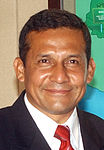
The Peruvian Aprista Party is a Peruvian political party and a member of the Socialist International. The party was founded as the American Popular Revolutionary Alliance by Víctor Raúl Haya de la Torre, who originally intended to create a network of anti-imperialist social and political movements in Latin America. Members are called "compañeros", based on the fraternity espoused by Haya de la Torre. Originally a centre-left to left-wing party with democratic socialist and nationalist elements, the party moved closer to the political centre under the leadership of Alan García starting in the 1980s, embracing social democracy and later some Third Way policies. In 2006, the party adopted a new platform as García's second presidency implemented a series of policies labelled as centre-right, embracing free-market capitalism, dialogue with other right-wing parties and organizations in the country, and closer ties with the Catholic Church and Evangelical churches.

Union for Peru is a Peruvian political party founded by Javier Pérez de Cuéllar, an ex-UN Secretary General, in 1994 to run for the presidency of Peru in the 1995 general elections. Originally a social democratic party, the party became the main political home of the Peruvian ethnocacerist movement in the late-2010s after a group led by former Army Major Antauro Humala joined the party. Humala later formed the Patriotic Front in 2018 and contested the 2021 general elections.

Javier Diez Canseco Cisneros was a Peruvian politician and member of the Peruvian Congress representing the Socialist Party of Peru (PS), of which he was a founding member and also served as its Party President.
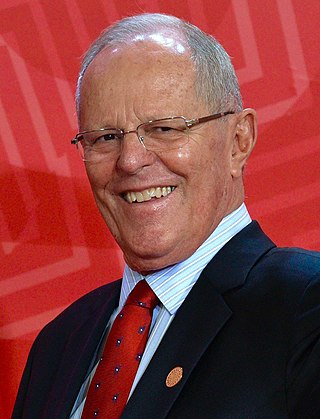
Pedro Pablo Kuczynski Godard, also known simply as PPK, is a Peruvian economist, public administrator, and former politician who served as the 59th President of Peru from 2016 to 2018. He served as Prime Minister of Peru and as Minister of Economy and Finance during the presidency of Alejandro Toledo. Kuczynski resigned from the presidency on 23 March 2018, following a successful impeachment vote and days before a probable conviction vote. Since 10 April 2019 he has been in pretrial detention, due to an ongoing investigation on corruption, money laundering, and connections to Odebrecht, a public works company accused of paying bribes.
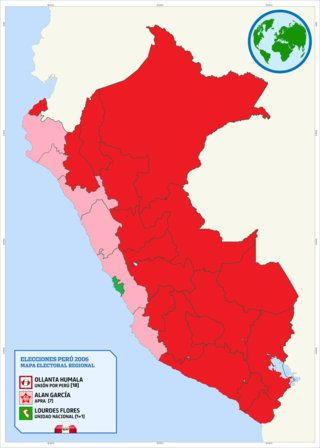
General elections were held in Peru in on 9 April 2006 to elect the President, two Vice-Presidents, 120 members of Congress and five members of the Andean Parliament for the 2006–2011 period. As the no presidential candidate received a majority of the vote, a second round was held on 4 June between the top two candidates, Ollanta Humala and Alan García. Garcia won the run-off with 52.63% to Humala's 47.37%. He was subsequently inaugurated on 28 July 2006, Peruvian Independence Day.

Peruvian Nationalist Party is a centre-left to left-wing political party in Peru.
Isaac Humala Núñez is a Peruvian labour lawyer and the ideological leader of the Movimiento Etnocacerista, a group of ethnic nationalists in Peru.
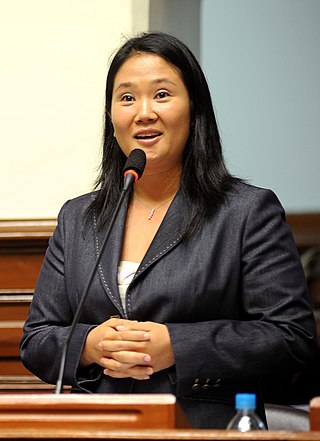
Keiko Sofía Fujimori Higuchi is a Peruvian politician. Fujimori is the eldest daughter of former Peruvian president Alberto Fujimori and Susana Higuchi. From August 1994 to November 2000, she held the role of First Lady of Peru, during her father's administrations. She has served as the leader of the Fujimorist political party Popular Force since 2010, and was a congresswoman representing the Lima Metropolitan Area, from 2006 to 2011. Fujimori ran for president in the 2011, 2016, and 2021 elections, but was defeated each time in the second round of voting.

Ollanta Moisés Humala Tasso is a Peruvian politician and former military officer who served as President of Peru from 2011 to 2016. Originally a socialist and left-wing nationalist, he is considered to have shifted towards neoliberalism and the political centre during his presidency.

Advance Country – Social Integration Party is a Peruvian political party. Founded in the northern city of Santiago de Chuco, La Libertad in 2000, the party nominated Ulises Humala, brother of future President Ollanta Humala, for the presidency in the 2006 general election, in the election, the party won 1.1% of the popular vote but no seats in the Congress of the Republic. The presidential ticket itself attained 0.2%, placing fourteenth nationally and subsequently lost its registration.

National Solidarity Party, was a conservative Peruvian political party. Founded in 1998 for the 2000 general election to support the candidacy of Luis Castañeda Lossio, a former Lima City Council member from Popular Action. Following the end of Alberto Fujimori's regime, the party formed the National Unity coalition with the Christian People's Party and other minor parties. Led by Lourdes Flores, the coalition placed third at the 2001 and 2006 general elections, while at municipal level, it won the capital city of Lima with Castañeda as the mayoral nominee.

Popular Force, known as Force 2011 until 2012, is a right-wing populist and Fujimorist political party in Peru. The party is led by Keiko Fujimori, former congresswoman and daughter of former President Alberto Fujimori. She ran unsuccessfully for the presidency in the 2011, 2016 and 2021 presidential elections, all losing by a narrow margin.

General elections were held in Peru on 10 April 2011 to elect the President, the Vice Presidents, 130 members of Congress and five members of the Andean Parliament. As no presidential candidate received a majority in the first round, a second round was held on 5 June to determine the successor of outgoing president Alan García. Former army officer Ollanta Humala narrowly defeated Keiko Fujimori, daughter of imprisoned former President Alberto Fujimori. Humala was sworn in as the 94th President of Peru on 28 July.

The Possible Peru Electoral Alliance was an electoral alliance in Peru formed for the 2011 general election, dominated by the eponymous party Possible Peru and led by presidential candidate and ex-president Alejandro Toledo.

The National Solidarity Alliance was an electoral alliance in Peru formed for the 2011 general election, dominated by the eponymous National Solidarity Party and led by presidential candidate Luis Castañeda.

Peru Wins was a leftist electoral alliance in Peru formed for the 2011 general election. It was dominated by the Peruvian Nationalist Party and led by successful presidential candidate Ollanta Humala Tasso.

General elections were held in Peru on 10 April 2016 to determine the president, vice-presidents, composition of the Congress of the Republic of Peru and the Peruvian representatives of the Andean Parliament.
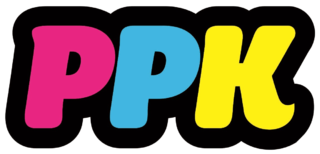
Peruvians for Change was a centre-right party in Peru.

General elections were held in Peru on 11 April 2021. The presidential election, which determined the president and the vice presidents, required a run-off between the two top candidates, which was held on 6 June. The congressional elections determined the composition of the Congress of Peru, with all 130 seats contested.
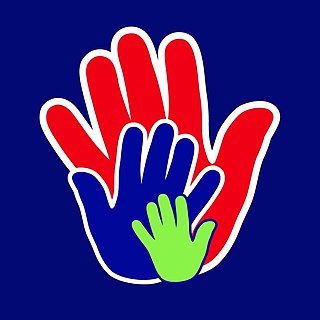
Peru Action (previously Peru Nation is a minor centre-right Peruvian political party.

